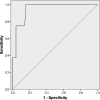Posttraumatic stress disorder in survivors of acute lung injury: evaluating the Impact of Event Scale-Revised
- PMID: 23699588
- PMCID: PMC4694105
- DOI: 10.1378/chest.12-0908
Posttraumatic stress disorder in survivors of acute lung injury: evaluating the Impact of Event Scale-Revised
Abstract
Background: Survivors of acute lung injury (ALI) and other critical illnesses often experience substantial posttraumatic stress disorder (PTSD) symptoms. However, most questionnaires have not been validated against a PTSD diagnostic reference standard in this patient population. Hence, in the current study of survivors of ALI, we evaluated the Impact of Events Scale-Revised (IES-R), a questionnaire measure of PTSD symptoms, against the Clinician-Administered PTSD Scale (CAPS), the current state-of-the-art PTSD diagnostic reference standard, which also provides a quantitative assessment of PTSD symptoms.
Methods: We evaluated the IES-R questionnaire vs the CAPS diagnostic interview in 60 of 77 consecutively recruited survivors of ALI from two prospective cohort studies of patients 1 to 5 years after ALI.
Results: The IES-R total score (range: 0.0-3.2) and the CAPS total severity score (range: 0-70) were strongly related (Pearson r=0.80, Spearman ρ=0.69). Using CAPS data, eight of the 60 patients (13%) had PTSD at the time of assessment, and an additional eight patients had partial PTSD (total prevalence, 27%). In a receiver operating characteristics curve analysis with CAPS PTSD or partial PTSD as criterion variables, the area under the curve ranged from 95% (95% CI, 88%-100%) to 97% (95% CI, 92%-100%). At an IES-R threshold of 1.6, with the same criterion variables, sensitivities ranged from 80% to 100%, specificities 85% to 91%, positive predictive values 50% to 75%, negative predictive values 93% to 100%, positive likelihood ratios 6.5 to 9.0, negative likelihood ratios 0.0 to 0.2, and efficiencies 87% to 90%.
Conclusions: The IES-R appears to be an excellent brief PTSD symptom measure and screening tool in ALI survivors.
Figures



Comment in
-
Surviving the ICU does not mean that the war is over.Chest. 2013 Jul;144(1):1-3. doi: 10.1378/chest.12-3091. Chest. 2013. PMID: 23880668 No abstract available.
-
Diagnostic and statistical manual of mental disorders, fifth edition, and the impact of events scale-revised.Chest. 2013 Dec;144(6):1974. doi: 10.1378/chest.13-1691. Chest. 2013. PMID: 24297138 No abstract available.
-
Response.Chest. 2013 Dec;144(6):1974-1975. doi: 10.1378/chest.13-1940. Chest. 2013. PMID: 24297139 No abstract available.
Similar articles
-
Screening for posttraumatic stress disorder in ARDS survivors: validation of the Impact of Event Scale-6 (IES-6).Crit Care. 2019 Aug 7;23(1):276. doi: 10.1186/s13054-019-2553-z. Crit Care. 2019. PMID: 31391069 Free PMC article.
-
Post-traumatic stress disorder symptoms after acute lung injury: a 2-year prospective longitudinal study.Psychol Med. 2013 Dec;43(12):2657-71. doi: 10.1017/S0033291713000214. Epub 2013 Feb 26. Psychol Med. 2013. PMID: 23438256 Free PMC article.
-
The SF-36 Offers a Strong Measure of Mental Health Symptoms in Survivors of Acute Respiratory Failure. A Tri-National Analysis.Ann Am Thorac Soc. 2016 Aug;13(8):1343-50. doi: 10.1513/AnnalsATS.201510-705OC. Ann Am Thorac Soc. 2016. PMID: 27111262 Free PMC article.
-
Cooccurrence of and remission from general anxiety, depression, and posttraumatic stress disorder symptoms after acute lung injury: a 2-year longitudinal study.Crit Care Med. 2015 Mar;43(3):642-53. doi: 10.1097/CCM.0000000000000752. Crit Care Med. 2015. PMID: 25513784 Free PMC article.
-
Reliability and validity of the Korean version of the Impact of Event Scale-Revised.Compr Psychiatry. 2009 Jul-Aug;50(4):385-90. doi: 10.1016/j.comppsych.2008.09.011. Epub 2008 Nov 21. Compr Psychiatry. 2009. PMID: 19486738
Cited by
-
Factors associated with missed assessments in a 2-year longitudinal study of acute respiratory distress syndrome survivors.BMC Med Res Methodol. 2018 Jun 15;18(1):55. doi: 10.1186/s12874-018-0508-8. BMC Med Res Methodol. 2018. PMID: 29907087 Free PMC article.
-
Virtual reality for relatives of ICU patients to improve psychological sequelae: study protocol for a multicentre, randomised controlled trial.BMJ Open. 2021 Sep 28;11(9):e049704. doi: 10.1136/bmjopen-2021-049704. BMJ Open. 2021. PMID: 34588250 Free PMC article.
-
Acute Respiratory Failure Survivors' Physical, Cognitive, and Mental Health Outcomes: Quantitative Measures versus Semistructured Interviews.Ann Am Thorac Soc. 2019 Jun;16(6):731-737. doi: 10.1513/AnnalsATS.201812-851OC. Ann Am Thorac Soc. 2019. PMID: 30844293 Free PMC article.
-
A systematic review finds limited data on measurement properties of instruments measuring outcomes in adult intensive care unit survivors.J Clin Epidemiol. 2017 Feb;82:37-46. doi: 10.1016/j.jclinepi.2016.08.014. Epub 2016 Nov 16. J Clin Epidemiol. 2017. PMID: 27865899 Free PMC article.
-
A COVID-19 Rehabilitation Prospective Surveillance Model for Use by Physiotherapists.J Clin Med. 2021 Apr 14;10(8):1691. doi: 10.3390/jcm10081691. J Clin Med. 2021. PMID: 33920035 Free PMC article.
References
-
- DiMartini A, Dew MA, Kormos R, McCurry K, Fontes P. Posttraumatic stress disorder caused by hallucinations and delusions experienced in delirium. Psychosomatics. 2007;48(5):436-439. - PubMed
-
- Griffiths J, Fortune G, Barber V, Young JD. The prevalence of post traumatic stress disorder in survivors of ICU treatment: a systematic review. Intensive Care Med. 2007;33(9):1506-1518. - PubMed
Publication types
MeSH terms
Grants and funding
LinkOut - more resources
Full Text Sources
Other Literature Sources
Medical
Miscellaneous

